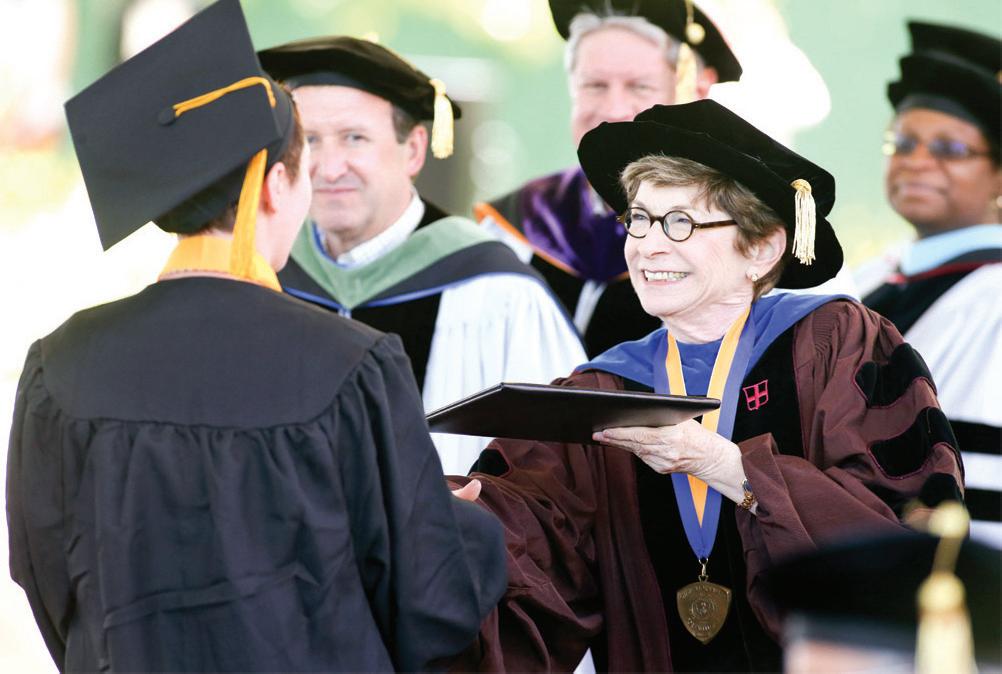
8 minute read
News
from July 18, 2013
Angle vs. Reid redux
Sharron Angle, the Republican candidate against U.S. Sen. Harry Reid in 2010, has not given up pressing some of her losing issues from that campaign.
Advertisement
In a recent online essay headlined “Does Harry Reid’s fortune come from illegal activity[?],” she recalls that in a 2010 campaign debate she asked Reid, “You came from Searchlight to the Senate with very little. Now you’re one of the richest men in the U.S. Senate. And on behalf of Nevada taxpayers, we’d like to know, how did you become so wealthy on a government payroll?”
As noted in our Newsview blog at the time (http://tinyurl.com/ p24nrvw), Reid was wealthy as an attorney before he went to D.C.
Angle revived this matter in order to try to link Reid to Harvey Whittemore, recently convicted for making illegal campaign contributions to Reid. But she offered no actual information to make her case. Like the 2010 debate and the title to her essay, she uses questions filled with emotionally loaded terms to suggest things she does not otherwise substantiate:
“Was the $150,000 a payback? ... Does ‘the fix’ go deeper? ... Who else owes Reid? Would candidate campaign reports containing the name ‘Whittemore’ be revealing?”
Paradoxically, she also asks a question that attacks Reid for asking questions: “Does Reid pass the smell test or just raise more questions?”
Sandoval ranked by jobs
Nevada Gov. Brian Sandoval has been ranked so-so by a business magazine for his job creation record.
Business Journals said the state had 970,600 jobs when Sandoval took office on Jan. 3, 2011 and now has 1,007,600. The publication thus places Sandoval at number 25 out of 45 governors. Five new governors who took office this year were not ranked. The magazine reports that the other 49 states have created private sector jobs at a 1.98 percent rate since Sandoval took office, but Nevada has done so at a 1.62 percent rate. For public sector jobs, the magazine used raw numbers instead of percentages and they show Nevada lagging behind SANDOVAL other states in creating public employee positions by minus-8,400. However, the magazine said the “overall rankings for this study are based on the difference in private-sector employment growth rates.”
Atkinson added, “We need more long-term strategies to create the environment for economic development. The legislature’s hands are tied when it comes to tax policy. They can’t do anthing except cut taxes.”
Photo/DENNIS MYERS
Pyramid/Tahoe Link blockage planned
Southbound Sparks Boulevard from Greg Street to the I-80 eastbound off-ramp has been closed since July 11 and will continued to be until July 22. In addition, left turns from eastbound Greg Street to northbound Sparks Boulevard are prohibited. The obstacles will accommodate construction of the Pyramid/Tahoe Highway Link.
—Dennis Myers
Stepping out
College president leaves, but first has her say
Western Nevada College president Carol Lucey fired a shot heard around by the state and even the nation last Dennis Myers week, resigning with a denunciation of Nevada public policies that have ravaged higher education. Lucey, a physicist and mathematician who has run the community college serving seven Nevada counties since 1999, said political leaders failed to keep their promise to do no further harm to the two northern community colleges at the Nevada Legislature this year. “We’re doing things I don’t feel good about and we shouldn’t have to do,” she said in an interview with Swift Newspapers.
Carol Lucey, Western Nevada College president
This year’s legislature cut her campus by 5 percent in the first year of the biennium, followed by 7 percent in the second year. That comes on top of cuts by the 2007 and 2011 legislatures. A new funding formula shifted money to southern campuses.
“You know what the last straw was?” Lucey told Swift’ Geoff Dornan. “Them saying there’s no money left and then Nic Cage getting what he got.”
Actor Nicolas Cage won enactment from the legislature of a tax break for moviemakers on a claim that the subsidy would generate economic activity, a claim challenged by Carole Vilardo of the Nevada Taxpayers Association.
At a legislative hearing earlier this year, Lucey said that one of the reasons she took the post of WNC president was because of the role of higher education in economic development and—in Nevada—economic diversification beyond gambling. She said she has worked hard on it.
“I’ve been president at WNC for 14 years,” she said. “When I came to the state, I was very excited by the desire to be part of diversification of the Nevada economy.”
WNC works with outfits like the Northern Nevada Development Authority and Churchill Economic Development Authority.
But the Legislature has been cutting higher education budgets deeply since 2007, with the result that other small states have leaped ahead of Nevada in attracting new companies. Lucey’s comments have been widely published in
Students study in the library at Western Nevada College, whose president is leaving office.
national forums like the Chronicle of Higher Education.
Lucey’s resignation and comments are likely to fuel an effort that had already been developing to shift policymaking for community colleges from the state level to the communities they serve. The practice of governing community colleges with a state board, as in Nevada, is not the practice in all states.
In addition, some educators and businesspeople hope that local communities will be more financially supportive of the colleges than the state has been.
In an interview with the RN&R, Lucey said she supports that notion. A stronger local base for the state’s community colleges would be more in keeping with what other states do, she said, and if current statewide policies prevail, the colleges won’t survive.
“I hope [that the colleges will be decentralized], because otherwise there won’t be colleges outside the urban areas,” she said. “Unless the funding process changes the colleges won’t survive, and I don’t think the funding process will change unless the governing process changes.”
Western Nevada College serves counties in western and central Nevada—Carson, Douglas, Churchill, Lyon, Storey, Mineral and Pershing. It is based in Carson City and also has campuses in Fallon and Minden. The Minden campus is on land provided by the high tech firm GE Bently and is adjacent to that corporation’s plant. (Great Basin College in Elko serves counties in the eastern region.)
“We also have [or] had rural centers in all the smaller communities of our service area, where we offered classes in person, via interactive video from the campuses, and online,” according to WNC spokesperson Anne Hansen. “Those rural centers have been closed or nearly closed due to the budget cuts, leaving multiple communities with little or no access to higher education. Even online learning can be difficult from these areas as not all communities have high speed internet required for course delivery, and many homes don’t have computer capabilities at all.”
She also said, “We recently had a nursing student mother from Hawthorne who drove 1,000 miles a week to complete the nursing
Lucey distributed diplomas to graduates last month.

program at WNC. Amazing, but certainly not something most people can manage. We also are the college that serves Lyon County, which has had the highest level unemployment for much of the economic downturn, along with a very low college-going rate.”
Though campus funding was not Lucey’s only reason for resigning, her comments are unusual. Compared to other nations, the United States does not have a strong tradition of protest resignations.
In their book Resignation in Protest, Edward Weisband and Thomas M. Franck wrote that for high level appointees, to speak out is to breach an elite loyalty code. After two U.S. officials resigned in 1996 to protest the Clinton administration’s welfare policies, Weisband said the “public would be well served if our system would allow officials to resign and go public more often when they felt deep disagreement on principle.”
In Nevada such actions have also been rare.
In 1953, Walter Van Tilburg Clark resigned as a University of Nevada lecturer to protest policies of campus President Minard Stout.
In 1956, 14 members of the North Las Vegas Police Department resigned in protest over the firing of the police chief and a captain.
In 1960, Reno Police Department night matron Pat Fladager resigned in protest against the firing of chief Bill Gregory and said several officers wanted to do the same but could not financially afford to leave.
In 1965, after he requested 44 new positions and the Nevada Legislature gave him none, highway patrol chief Robert Stenovich resigned.
In 1978, Nevada state personnel office employee Nancy Frank resigned in protest after Gov. Mike O’Callaghan’s office intervened on behalf of a governor’s office worker who had applied for a job but flunked the test for it.
In 1993, state General Services director Terry Sullivan retired and spoke out against policies of Gov. Robert Miller.
In 2005, Margaret Goodman of Las Vegas resigned as chief ringside physician for Nevada state boxing regulators in protest against the state’s failure to adopt stringent ring safety procedures.
In 2006, Regional Planning Commission member Fred
Lokken resigned over the issue of Winnemucca Ranch and the firing of commission executive director David Ziegler.
Lucey said she spoke out because she had run out of ways of dealing with the campus problems and could not face another legislature.
“No, actually, I couldn’t have left quietly,” she said. “Someone will always want to know, Why did you leave? So this was not a protest resignation. I would call it more, What else can I do?”
She went on, “It’s a lovely, lovely college. Students succeed here. We’re doing a good job with our businesses to get them good jobs. But I just don’t see a good future.” Ω
Anne Hansen Western Nevada College














